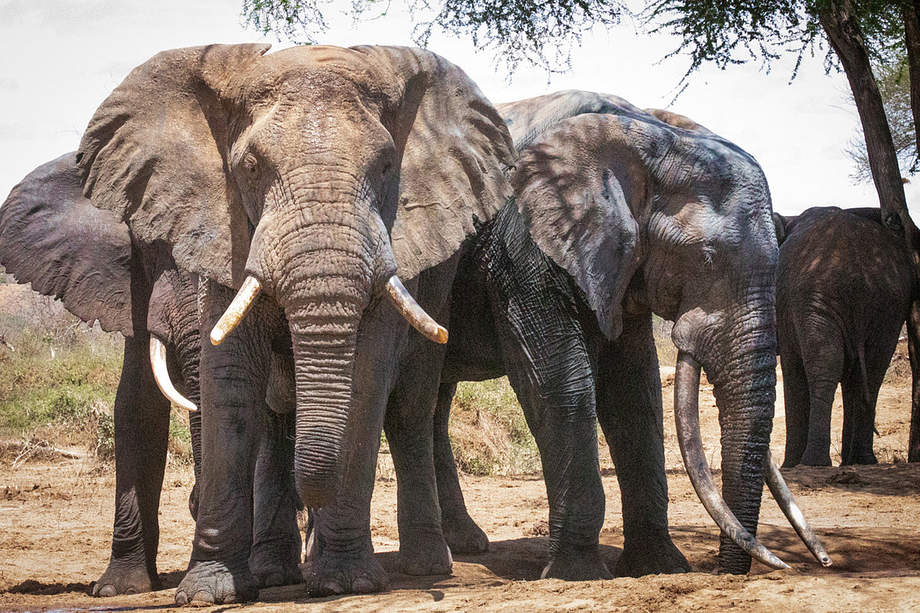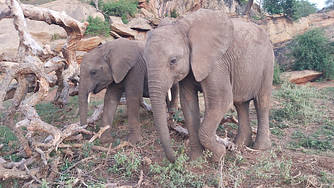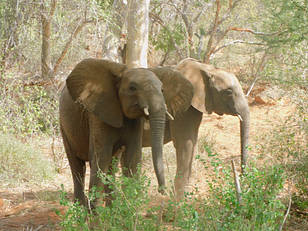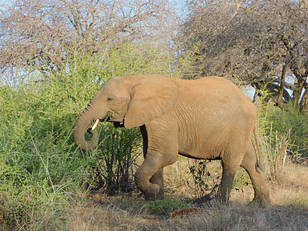Ithumba Reintegration Unit
At Ithumba, the stockades are divided into five ‘classes’ by age. Many of the oldest orphans in ‘Class Five’ are finding the courage to explore further afield without the reassuring presence of the Keepers. Mutara’s wild-living herd has been a catalyst for this development. While they come to spend time with their beloved Dololo, they also happily chaperone the Class Five orphans as they explore their independence.

It became routine for Barsilinga, Tusuja, Olsekki, Kauro, Oltaiyoni, Roi, Kamok, Naseku, and Siangiki to team up with Mutara’s herd towards the end of the day. Instead of returning to the stockades with the others, they would spend more time browsing with their older friends and return later in the evening on their own timeline. Galla occasionally joined them, despite the fact that he is in Class Four. Reintegration is a very gradual journey, and these orphans still seek the safety of the stockades at night. Mutara’s herd seems to understand this, as they escort the group back home whenever they are ready. Sities, Suguta, and Turkwel remain fixated maximizing their time with Dololo, which is why they camp outside the stockades most evenings. They even managed to abscond with him a few times this month, although they always bring him back him eventually — looking very sheepish all the while!
Tragedy struck Ithumba at the end of June, with the unexpected death of our dear Maisha. While she had only been at Ithumba for a month, she had settled in very well and had already become a great favourite of the other orphans. However, a sudden and mysterious ailment took hold of our girl, and despite input from a team of vets and round-the-clock efforts, Maisha passed away on the 26th. Her symptoms point to tetanus, although she didn’t respond to the medications and antitoxins administered. We are all still trying to make sense of such a devastating turn of events.
In the wake of this heartbreak, we turned our attentions to Nabulu, who had graduated with Maisha from the Nursery just the month before. Once again, we were astounded by the intuitive healing power of elephants. On the afternoon of Maisha’s passing, Nabulu walked down to smell her final resting spot. She found a suitable place nearby, where she lay down for three minutes to grieve for her departed friend. After observing this mourning period, Nabulu got back to her feet and resolutely went over to her milk bottle, as if she knew that her friend would have wanted her to carry on with her head held high. Over the following days, Malkia was very attentive towards Nabulu and rarely left her side. Nabulu is also good friends with a number of the orphans at Ithumba from her Nursery days, such as Sattao, Dololo, and Musiara, so she never felt alone.
There were plenty of new sights and sounds to distract Nabulu too. The drier months of June through October always bring back many of our wild-living orphans, as they seek out the water and creature comforts closer to home. We were treated to a number of familiar faces this month. The day after Maisha passed away, Galana’s herd arrived on the scene. She and her baby, Gawa, Loijuk, baby Lili, Lenana, baby Lapa, Makena, Kilabasi, Narok, Kitirua, Naisula, Ishanga, Tumaren, and Ukame were all looking very well. Nabulu was visibly delighted to see the small babies, as perhaps they reminded her of being a matriarch at the Nursery, and she doggedly shadowed Lapa and Lili. In fact, she nearly disappeared with the herd, had the Keepers not ushered her back! Ukame, who joined Galana’s ex-orphan herd at the beginning of the year, is doing very well in their company and has become an excellent nanny to their babies.
After over a year’s absence, we were delighted to see Taita looking very healthy. He turned up to the mud bath one day as fellow ex-orphan bulls Challa and Zurura were wallowing in the company of ten wild bulls. Big boy Rapsu arrived towards the end of the month. Little Musiara stood in complete awe of this friendly 18-year-old, perhaps wondering when he might reach a similar size! Nine-year-old Bomani showed up on the 21st, after a spell away. He used to be Orwa's best friend, but they recently went their separate ways. We saw Orwa in the company of a wild herd this month, but Bomani decided to stick with the dependent orphans. He paid special attention to Sattao, Dololo, and Karisa, teaching them pushing tactics that he had learned during his time away.
Twelve-year-old Kilaguni is an independent spirit, but he seems very fond of the orphans. One morning, we found him still sleeping outside the stockades when the dependent herd was let out. As soon as he heard them, he woke up and stood facing the lucerne store in anticipation of a good breakfast. Perhaps it is the lucerne he fancies more than the young babies!
It has been interesting to observe Mundusi this month. This young bull, along with Esampu and Mteto, graduated from the Nursery slightly earlier than usual in an attempt to temper their mischievous behaviour. However, he is still quite a handful at Ithumba! From time to time, Mundusi tries to elevate his position by challenging his older friends, but he can get a rude shock when he takes it too far. None of the orphans — even relatively docile ones, such as Kauro — hesitate to teach the young upstart a lesson. We are sure that Mundusi will understand to respect his elders soon enough. One day, a wild bull pushed him away for being too brazen and boisterous. This sent Mundusi running in the opposite direction, which was quite a contrite response coming from him!
Musiara is another spoiled little boy, especially by Maramoja. While he is gentle by nature, he has been trying to prove his strength a bit more and even initiated a spirited fight with Rapa one day. Naseku and Kamok still have a soft spot for Ambo and escort him throughout the day. Jotto and Pare remain favourite playmates and can be seen engaged in at least one pushing game a day. Wanjala, Rapa, and Sana Sana have been tiptoeing in the footsteps of Class Five, enjoying their own private browsing sessions far away from the others. It is so encouraging to see how well our orphans are honing their wild instincts and gradually reclaiming their place in the wild.


